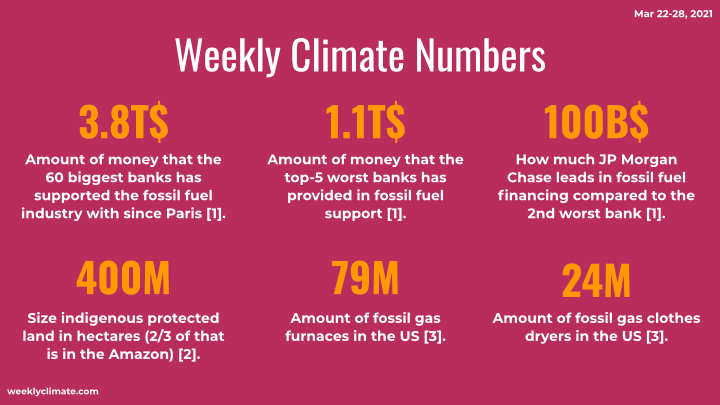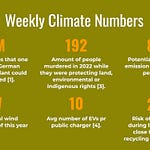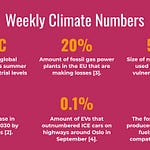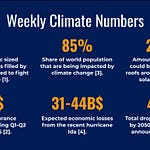Welcome to this weeks edition of The Weekly Climate 🎉
‼️News you can’t miss
Here’s one important scary/bad (🙀), good (😻), interesting (😼) and fossil (💩) news item.
🙀 The 60 biggest banks has funneled 3.8T$ into the fossil fuel industry since the Paris Agreement.
😻 It looks like more and more ad agencies have stopped working with the fossil fuel industry.
😼 Bacterias, that can help ice form?! (and the opposite)
💩 Experienced climate journalist Ketan Joshi, goes through the wellknown fossil fuel industry tactics for shifting politicians focus away from them and onto other things.
👩⚕️ Status: Climate & Science
Let’s look at how we’re doing this week!
[#arctic] — Researchers have detected that lightning strikes in Arctic have increased 3x since 2010. While the study hasn’t directly linked the increase in lightning strikes to global warming, the increased lightning strikes are expected to form due to increased humidity in the air above the Arctic which is in turn caused by global warming.
[#australia] — Australia is experiencing the worst floods in nearly half a century due to torrential rains. The floods have swept away anything from homes to livestock. About 40.000 people have been evacuated.
[#wildfires] — Did you think wildfires is just a thing happening to the US, Australia and Siberia? A new study indicates that the UKs risk of wildfires is increasing as well as climate change continues.
📰 The 7 Grand Challenges
⚡️Decarbonize Electricity
Clean electricity is the one do-or-die challenge we must solve.
[#interview] — A wonderfully sane interview of the Saul Griffith on what we must do to solve the climate crisis. He counts all the things we (in this case focus on the US) need to do such as replacing 79 million fossil gas furnaces and so on.
[#geothermal] — A company called Greenfire will attempt to revive a geothermal well in the Phillipines. The geothermal plant was turned due to high amounts of non-condensable gases present in the stream. But Greenfire will attempt to mine those gases and hereby hopefully reenable the well.
🏘 Reduce impact of urban and rural areas
Lowering the impact of urban and rural areas.
[#publictransport] — Since the start of the pandemic public transport revenue has fallen off a cliff. People are staying home and when they’re going out they try to avoid public transport to reduce risk of catching COVID. This is a problem, because if there’s one thing that we’re going to need to solve the climate crisis its more public transport.
[#ev] — Volkswagen is quickly catching to Tesla’s EV sales. Analysts predict that VW will be very close to catching up to Tesla sales this year and may even surpass Tesla next year. It’s great to see a big auto maker doing good in the EV space as it may encourage others to follow suit (and as a good AFAIK you can’t buy a VW with bitcoin 🙄).
[#waterheater] — This article dives into the practical details of replacing your water heater with something better. But what? There are many models out there and most of them are bound to be better than what you currently have.
[#losangeles] — LA has laid out it’s in-depth plan to go 100% renewable by 2045 or even as fast as 2035. The study has shown that multiple paths exists for the city to achieve its goals.
🛁 Clean non-electrifiable activities
Some activities we do today can’t be electrified, these must be cleaned some other way.
[#aviation] — Sweden plan to increase airport fees for airline companies that fly with polluting airplanes. The hope is that this move will help push the industry to use more cleaner planes (or more expensive plane tickets).
🌳 Protect and grow nature
Nature is our ally, we must protect it and help it help us.
[#indigenous] — To protect forests we must get help from the indigenous people that live in them. A new study has shown that land protected by indigenous people are less prone to degradation and deforestation. Currtently, indigenous people protect more than 400 million hectares, which is about the same size as France and Germany combined. With 2/3 of this being in the Amazon.
[#soilcarbon] — One of the biggest carbon sinks on the Earth may have been overestimated a study found. When plants grow they increase the amount of carbon in the soil. So it was expected to find that if plant growth accelerated (for instance due to higher levels of CO2) that soil carbon would accelerate too. But 100 experiments have now confirmed that this is not the case.
🍽 Optimize food
Without the lower impact of food or drink the hero doesn’t work (modified old danish proverb).
[#bacteria] — Did you know that a bacteria can help form ice? And that’s a problem if you’re trying to grow crops. In California a research scientist have been studying bacterias that can cause ice to form at above freezing temperatures and the opposite, bacteria that can help replace those iceforming bacterias with others that doesn’t help ice form.
[#meat] — JBS, the worlds largest meat producer, vows to go net zero by 2040. The company just reported a record setting year in terms of profits and thus have plenty of cash on hand to get to net zero. One place to start: Eliminate Amazon deforestation from it’s supply chain.
[#lesotho] — CarbonBrief takes a deep dive in the 2007 drought in Lesotho. Lesotho is one of Africa’s least developed countries and in 2007 a severe drought upset it’s delicate food systems. This article examines how climate change helped fuel that drought.
[#fishing] — A trawl fish ban has been instituted off the coast of Sussex in order to help restore seaweed forests. It is hoped that this move will help “rewild” the coastline as the seaweed forests provide habitats for many fish.
⚖️ Climate Justice
Without justice there’s no future.
[#greenbanking] — A new report by the African Development Bank and the Climate Investment Fund looks at applying so called Green Banking to 6 African countries in order to help finance climate mitigation projects such as renewable energy deployment and climate smart agriculture.
[#oilcountries] — A new report highlights that countries that have not managed to switch their economy away from producing and exporting fossil fuels will have an increased risk of civil unrest. Countries such as Algeria, Iraq, Nigeria, Chad and Kazakhstan are among the countries with the highest risk according to the report.
[#canceralley] — A follow-up story from Inside Climate News about the planned plastics plant in Louisiana’s “Cancer Alley” that asks do we really need it? A new report indicates that no we don’t.
⬇️ Engineered drawdown and geoengineering
Protecting our planet and species one way or another
[#solarradiationmanagement] — In a new report the US National Academy of Sciences, Engineering and Medicine urges the worlds governments to figure out if the geo engineering technology “solar radiation management” will work or not. And its raising a number of eyebrows as many people fear both general apathy to doing anything about the real problem of climate change as well as the many many unforeseen consequences that this technology could have.
📦 Other / catch-all
All the other stuff that I couldn’t fit into any of the other categories, than the other category.
[#billionaires] — A look at what four billionaires are doing try to and help solve the climate crisis: Elon Musk, Bill Gates, Yishan Wong and Jeff Bezos.
[#book] — Kimberly Nicholas has a new book out called “Under the sky we make” which argues in a very scientific way how much our individual actions actually matter. Especially if you live in a wealthy country, you actions matter a lot. It made my list!
[#portrait] — Grist did an interesting and inspiring portrait of 19-year old climate activist veteran Jamie Margolin and the movement she created: Zero Hour.
[#fixers] — Finally, if you’re looking for some Monday morning inspiration check this out. This years Grist Fixers is out. The Grist Fixers is a list of 50 extraordinary people who are using their skills to help solve the climate crisis and other social issues. There are some truly amazing human beings in there.
⭐️Special Topics
🎩 Global and local policy
We have a special interest in covering the major global and local policies regarding climate, whether good or bad.
[#finance] — Climate Action 100+ is a group of investors representing about half of the world’s invested capital. That’s right, about half. And they just published a benchmark of the worlds’ largest corporate emitters. It is deeply hoped that a framework such as this will more and more push these emitters to change. Here’s a Reuters piece going in to a bit more detail than the press release.
[#buildings] — The EU has launched a new program called Renovation Wave which aims to put focus on renovating and energy optimizing buildings across the EU via introduction of state aid schemes, national targets for building renovation and integration of renewable energy.
[#trump] — The U.S. Environmental Protection Agency (EPA) has started to review Trump’s attacks on science. The EPA will review the Trump administration interference in science.
⛽️Major Carbon Emitters
We have a special interest in covering the moving of the major carbon emitters as these are the key roadblock to climate action.
[#gas] — Yet another tale of a city (Philadelphia in this case) that is trying to get off gas, but where a utility or gas association intervenes and derails it.
[#ads] — It may look like ad agencies are finally starting to move away from oil and gas companies. More and more ad agencies have signed on to Fossil Free Media’s pledge to stop working for oil and gas companies.
[#china] — This detailed article in Yale 360 once again highlights the issue facing China: Their pledges to cut emissions, but their apparent plan to do the opposite: Build a heck of a lot of coal. 246GW to be exact is under planning or construction. Which is 6x Germany’s coal capacity.
[#netzero] — What does a net zero pledge actually mean? This article by DesmogBlog dives into that. Everyone and their mother *ahem* pet fossil fuel industry company have made these in the past month. So what does one actually mean, and more importantly, will we solve the climate crisis if we do it?
[#fossiltactics] — Ketan Joshi looks at how the fossil fuel industry is fooling everybody, what tactics they use and how we can beat them. Very enlightening read.
[#sports] — The sports industry is on the line this time in a new report that has analyzed sponsorships in various kinds of sports. And concludes that sponsorships from oil and gas and other major emitters are running rampant in the sports industry. In this way the emitters manage to “sports-wash” themselves by being associated with a successful sports team.
That’s it for this week folks! Remember if you’re feeling down, angry or sad from some of the news in this newsletter one cure is to act. And one way you can always act that also happens to be one of the most powerful things you can do is to talk about it. That also works if what you just read made you hopeful or happy btw.
If you enjoyed this newsletter don’t forget to share it with your friends, coworkers or other people you think could benefit from getting it. If you got directed here by a friend or another link on the Internet don’t forget to subscribe!
See you all next week 👋












